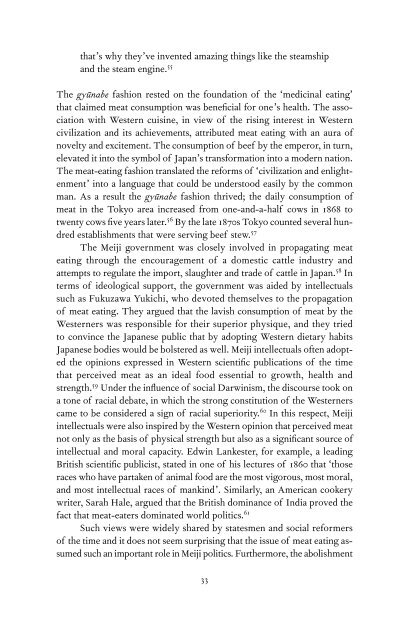Download - Brainshare Public Online Library
Download - Brainshare Public Online Library
Download - Brainshare Public Online Library
You also want an ePaper? Increase the reach of your titles
YUMPU automatically turns print PDFs into web optimized ePapers that Google loves.
that’s why they’ve invented amazing things like the steamship<br />
and the steam engine. 55<br />
The gyūnabe fashion rested on the foundation of the ‘medicinal eating’<br />
that claimed meat consumption was beneficial for one’s health. The association<br />
with Western cuisine, in view of the rising interest in Western<br />
civilization and its achievements, attributed meat eating with an aura of<br />
novelty and excitement. The consumption of beef by the emperor, in turn,<br />
elevated it into the symbol of Japan’s transformation into a modern nation.<br />
The meat-eating fashion translated the reforms of ‘civilization and enlightenment’<br />
into a language that could be understood easily by the common<br />
man. As a result the gyūnabe fashion thrived; the daily consumption of<br />
meat in the Tokyo area increased from one-and-a-half cows in 1868 to<br />
twenty cows five years later. 56 By the late 1870s Tokyo counted several hundred<br />
establishments that were serving beef stew. 57<br />
The Meiji government was closely involved in propagating meat<br />
eating through the encouragement of a domestic cattle industry and<br />
attempts to regulate the import, slaughter and trade of cattle in Japan. 58 In<br />
terms of ideological support, the government was aided by intellectuals<br />
such as Fukuzawa Yukichi, who devoted themselves to the propagation<br />
of meat eating. They argued that the lavish consumption of meat by the<br />
Westerners was responsible for their superior physique, and they tried<br />
to convince the Japanese public that by adopting Western dietary habits<br />
Japanese bodies would be bolstered as well. Meiji intellectuals often adopted<br />
the opinions expressed in Western scientific publications of the time<br />
that perceived meat as an ideal food essential to growth, health and<br />
strength. 59 Under the influence of social Darwinism, the discourse took on<br />
a tone of racial debate, in which the strong constitution of the Westerners<br />
came to be considered a sign of racial superiority. 60 In this respect, Meiji<br />
intellectuals were also inspired by the Western opinion that perceived meat<br />
not only as the basis of physical strength but also as a significant source of<br />
intellectual and moral capacity. Edwin Lankester, for example, a leading<br />
British scientific publicist, stated in one of his lectures of 1860 that ‘those<br />
races who have partaken of animal food are the most vigorous, most moral,<br />
and most intellectual races of mankind’. Similarly, an American cookery<br />
writer, Sarah Hale, argued that the British dominance of India proved the<br />
fact that meat-eaters dominated world politics. 61<br />
Such views were widely shared by statesmen and social reformers<br />
of the time and it does not seem surprising that the issue of meat eating assumed<br />
such an important role in Meiji politics. Furthermore, the abolishment<br />
33







